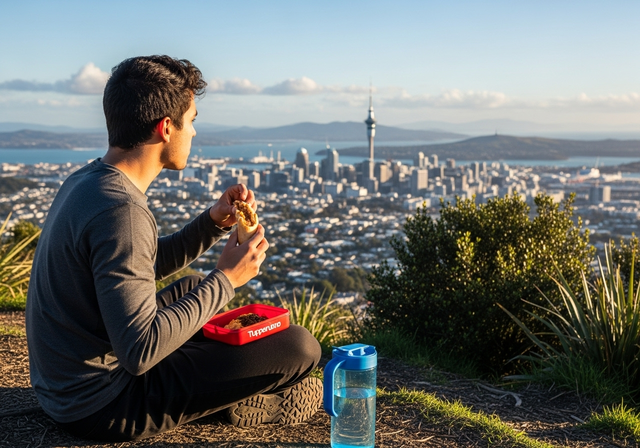Exchange in New Zealand: cost of living in Auckland in 2025

The cost of living in Auckland varies significantly depending on your personal choices, lifestyle, and most importantly, your priorities as an international student. Let's dive into the real numbers and find out how to plan your budget for an unforgettable experience.
Why Auckland is special for exchange students
Before we talk about numbers, it's important to understand Why choose New Zealand for your exchange. Auckland is home to around a third of the country's population and offers a unique combination that few destinations can match.
The city pulses with multicultural energy, where you can have breakfast in Little India, lunch in Chinatown, and dinner at a Maori restaurant, all on the same day. Discover the benefits of doing an exchange in Auckland reveals how the city offers unique opportunities both for studies and for personal development.
Auckland also stands out for its ease of finding work, especially important for those who want work and study in New Zealand. The local job market is welcoming to international students, offering opportunities in a variety of sectors.
Detailed breakdown of monthly costs
Accommodation: Your Biggest Investment
Housing represents, without a doubt, your biggest monthly expense. In Auckland, options vary dramatically in price and quality:
Room in a shared house: Between NZD 250 to NZD 350 per week This is the most popular option among students. You share the house with other residents, often a mix of locals and international students. It's a great way to practice English and make lasting friendships.
Homestay: From NZD 280 to NZD 380 per week Living with a New Zealand family generally includes breakfast and dinner. It's a complete cultural immersion, especially valuable in the first few months when you're still adjusting to the country.
Studio in the center: Above NZD 500 per week If privacy is a priority, prepare to invest significantly more. Well-located studios can easily exceed NZD 2,000 monthly.
Food: balancing practicality and economy
The food budget can vary hugely based on your habits:
Shopping at the supermarket: NZD 80 to NZD 120 weekly Cooking at home is the most cost-effective way to eat well. New Zealand supermarkets offer fresh, quality produce, although some imported items can be pricey.
Meals at restaurants: NZD 15 to NZD 25 per meal Eating out occasionally is part of the cultural experience. Auckland offers a diverse dining scene, from budget food trucks to upscale restaurants.
Transportation: Exploring the City
Auckland has an efficient public transport system that connects the entire metropolitan area:
Monthly pass: NZD 150 to NZD 200 Auckland Transport offers passes that cover buses, trains, and ferries. It's a worthwhile investment, especially if you live far from the center.
Economic alternatives: Many students choose bicycles or hikes for short trips, saving significantly on the monthly budget.
Additional costs that make a difference
Compulsory health insurance
Every international student must have health insurance, costing between NZD 100 and NZD 150 per month. This isn't an optional item—it's required to keep your student visa valid.
Telephony and Internet
Mobile and home internet packages amount to between NZD 50 and NZD 100 per month. New Zealand has good internet coverage, essential for keeping in touch with family and friends in Brazil.
Leisure and entertainment
Auckland offers numerous free and paid activities. Reserve between NZD 100 and NZD 200 monthly for movies, bars, weekend trips, and other social activities.
The full financial picture
Adding up all the essential expenses, an international student must plan between NZD 1,800 to NZD 2,550 monthly to live comfortably in Auckland. This amount aligns with government student visa requirements, which require proof of approximately NZD 1,667 per month.
Balancing work expenses
The good news is that international students can work up to 20 hours a week during term time. With the minimum wage of NZD 23.50 per hour in 2025, this represents a potential income of up to NZD 1,880 per month — enough to cover a good part of basic costs.
How does the exchange work in New Zealand offers valuable tips on how to manage your money and exchange wisely, maximizing your purchasing power.
Practical tips for saving
Strategic housing choice: Consider areas a little further away from the center but well connected by public transport. You can save hundreds of dollars monthly.
Cook at home: Not only does developing cooking skills save money, it's also a great way to socialize with other students.
Take advantage of free activities: Auckland offers numerous parks, beaches, and free cultural events. The city is designed to be enjoyed without necessarily breaking the bank.
Use local apps: Do they exist essential apps for those who are going to do an exchange in New Zealand that can help you find promotions, cheaper transportation, and cost-effective activities.
Smart financial planning
The secret to a successful Auckland experience lies in careful planning. We recommend that you:
- Reserve an extra amount: Always have 20% more than your planned emergency budget
- Monitor initial expenses: The first few months are often more expensive due to installation costs
- Explore different neighborhoods: Each area has its own personality and price range
- Connect with other students: Sharing costs and experiences makes everything more economical and fun
Be Easy: turning dreams into reality
Planning an exchange in Auckland may seem challenging, but you don't have to do it alone. A Be Easy Offers the program Study and Work in New Zealand, with full support from financial planning to adaptation in the country. Our experienced team helps you find the best course, accommodation, and work options, ensuring that your investment is maximized. Contact us and discover how to make your New Zealand dream a financially planned and emotionally rewarding reality!


